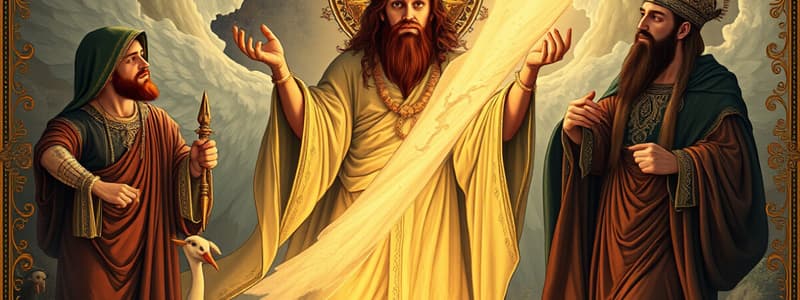Podcast
Questions and Answers
What is Apostasy?
What is Apostasy?
The total repudiation of the Christian Faith.
Who are considered Apostles?
Who are considered Apostles?
The twelve chosen by Jesus and others like St. Matthias and Paul of Tarsus.
What does Apostolic indicate about the Church?
What does Apostolic indicate about the Church?
The Church was founded by Christ and given to the apostles.
What is Apollinarianism?
What is Apollinarianism?
What does Arianism claim about Jesus Christ?
What does Arianism claim about Jesus Christ?
What is the Athanasian Creed?
What is the Athanasian Creed?
What does Ekumenical mean?
What does Ekumenical mean?
What is the purpose of Ecumenism?
What is the purpose of Ecumenism?
What does Gnosticism teach about salvation?
What does Gnosticism teach about salvation?
What is Heresy?
What is Heresy?
What is the Holy See?
What is the Holy See?
What does Immutable mean in the context of the Church?
What does Immutable mean in the context of the Church?
What is Indulgence?
What is Indulgence?
What is Canon Law?
What is Canon Law?
What does Indefectible mean?
What does Indefectible mean?
What is Logos in the New Testament?
What is Logos in the New Testament?
What are the Marks of the Church?
What are the Marks of the Church?
What is Monophysitism?
What is Monophysitism?
What is Neo-Platonism?
What is Neo-Platonism?
What does Nestorianism teach about Christ?
What does Nestorianism teach about Christ?
What are the Eastern Orthodox Churches?
What are the Eastern Orthodox Churches?
What does Perennial mean in relation to the Church?
What does Perennial mean in relation to the Church?
What is Protestantism?
What is Protestantism?
What was the Reformation?
What was the Reformation?
What is a Schism?
What is a Schism?
What does Schismatic mean?
What does Schismatic mean?
What are Separated Brethren?
What are Separated Brethren?
What does Theotokos mean?
What does Theotokos mean?
What does Unicity refer to in the context of the Church?
What does Unicity refer to in the context of the Church?
What is the Deposit of Faith?
What is the Deposit of Faith?
Flashcards are hidden until you start studying
Study Notes
Apostacy and Heresy
- Apostacy refers to the total repudiation of the Christian Faith, forbidden by the First Commandment.
- Heresy denotes the obstinate denial of a truth that must be believed with divine faith.
Apostolic Nature of the Church
- Apostolic indicates the Church was founded by Christ and entrusted to the apostles.
- The Church is apostolic in three key ways:
- Built upon the foundation of the apostles.
- Guards and transmits apostolic teachings through the Holy Spirit.
- Maintains apostolic succession via bishops, with the Pope as St. Peter's successor.
Key Heresies
- Apollinarianism: Denies that Christ had a fully human mind and will, asserting he only possessed a divine nature.
- Arianism: Claims Jesus Christ is not truly God or equal to the Father, presenting Him as a unique creature elevated to "Son of God" due to his fidelity.
- Gnosticism: Teaches that salvation comes from secret knowledge, denying Christ's true humanity and divine nature.
- Monophysitism: Asserts Christ has only one nature, merging divine and human aspects.
- Nestorianism: Argues that Christ is two separate persons (divine and human) rather than one person with two natures.
Creeds and Official Teachings
- The Athanasian Creed, authored by St. Athanasius, outlines Christian beliefs against Arianism.
- The concept of "Logos" refers to Jesus Christ, emphasizing his divine nature in the New Testament context.
Church Structure and Authority
- Holy See refers to the Pope's diocese, embodying the central administration of the Catholic Church.
- Canon law is the official internal law of the Church, distinguishable between Latin and Eastern rites.
Church Characteristics
- Immutable means the Church will not change in its essential aspects, derived from its divine nature.
- Indefectible signifies having no flaw, also tied to the Church's divine origin.
- Perennial indicates the Church's existence until the end of time, inherent to its divine foundation.
- Unicity highlights the Church’s uniqueness as the sole institution founded by Christ.
Ecumenical Efforts
- Ecumenical pertains to the global communion of bishops and councils addressing universal Church issues.
- Ecumenism seeks to unify Christians globally and foster cooperation among various denominations.
Historical Context
- Protestantism encompasses denominations that split from the Catholic Church during the Reformation in the 16th century.
- The term schism denotes a breach of unity, particularly the refusal to recognize papal authority.
Other Terminologies
- Separated brethren refers to individuals from schismatic communities often unaware of the Catholic Church's truths due to circumstances of their birth.
- Theotokos, meaning "Bearer of God," is a title for Mary that affirms Christ's divine and human natures, established at the Council of Ephesus in AD 431.
- Deposit of Faith includes sacred tradition and scripture, remaining immutable and essential to the Church's teachings.
Studying That Suits You
Use AI to generate personalized quizzes and flashcards to suit your learning preferences.




